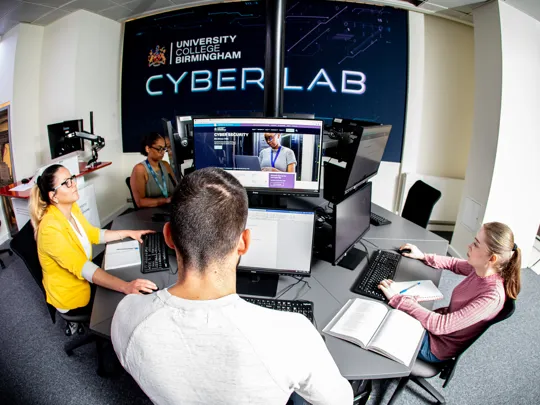of graduate employers say relevant experience is essential to getting a job with them
Why should I choose to study Computer Science MSc / PGDip?
- PRACTICAL APPLICATION – Develop your practical computing skills in our excellent IT facilities including a dedicated Cyber Security Lab
- WORK PLACEMENT (MSc only) – Complete an optional three-month or six-month placement in the IT sector to boost your experience and industry connections on successful completion of the taught part of the course
- IN-DEPTH RESEARCH – Explore a topic within computing and technology in depth by conducting your own master’s research project
- NO EXAMS - If you are not keen on exams, this course is for you. Unlike many degrees in this field, you will have no written exams during or at the end of the course and will be assessed through practical assessments and coursework only
- AWARD-WINNING UNIVERSITY – Study at the highest-ranking university in the region according to student choice (Whatuni Student Choice Awards 2023)
Our facilities
As a student on our postgraduate computing course, you will have access to cutting-edge IT facilities on campus, including our purpose-built Cyber Security Lab.
Course breakdown
- Postgraduate
Core Modules
Object-Oriented Programming for Software Development
This module introduces and develops object-oriented design and programming skills. You will learn object-oriented design and programming skills using data structures, design patterns, polymorphism and concurrency (threads and multi-processing). You will work individually to develop an application based on a specification that you will analyse to produce a design, implement and test.
Web Engineering
In this module, you will learn to build websites using emerging web engineering techniques and standards. You will cover web standards, system frameworks and protocols before moving onto development of multi-platform, multi-device web applications. You will learn how to use automated testing and version control before finally deploying your application securely.
Artificial Intelligence and Machine Learning
This module will introduce you to the fundamental understanding of core artificial intelligence (AI) concepts and machine learning ideas. It explores various AI concepts such as problem-solving (problem representation, uninformed and informed search), knowledge representation (logic-based languages, e.g. description logic, ontologies and the semantic web) and machine learning. This module will further cover the types of learning problems (classification, regression, clustering etc.) and the taxonomy of machine learning algorithm topics such as Bayesian networks, decision tree learning, support vector machines, supervised, unsupervised and reinforcement learning. You will learn how to apply these methods to real-life problems.
Data Warehousing
This module aims to provide the key concepts and principles of data technologies ranging from database to data warehousing. You will learn database fundamentals, how to apply appropriate tools to design and develop a database system, SQL syntax and queries to manage a database for a substantial problem. It will further help you acquire in-depth specialised knowledge in data warehousing areas, including principal theories, analytical foundations, and the key considerations for data warehousing development. This module also explores new ideas and emerging trends such as data analytics, big data, and cloud computing associated with data warehousing.
Computer Networks and Virtualisation
This module covers advanced topics in networking and data transmissions by setting an in-depth understanding of the issues associated with network services. It considers modelling, simulation, emulation, planning and optimisation of communication networks. It explores various networking algorithms to provide you with an insight into cutting-edge and emerging computer network technology, such as network virtualisation, concepts of virtualisation and cloud computing, including network principles and architectures. By the end of this module, you will be able to design, explain, and test different networks and protocols, select appropriate approaches to the network stack level, and justify the choices made by implementing physical and logical networks.
Human-Computer Interaction
This module introduces principles of human-computer interaction (HCI) in the context of evaluation paradigms. It contains the fundamental concepts and methods for understanding users, stakeholders, contexts and requirements, and a practical experience of how these requirements can be met using methods for requirements elicitation, interface design, and usability evaluation. The module aims to provide you with a working knowledge of interaction design and user experience principles with an end-to-end interaction design process. By the end of the module, you will be able to utilise prototyping techniques for developing and evaluating interactive technologies using appropriate tools and software.
Masters Research Project
This module introduces you to the disciplines and techniques required for critical appraisal of complex data and industry practice; creating research designs and accompanying research techniques; building theoretical frameworks, and the scheduling and execution of a research project. The module will develop your skills and expertise in the essential research tools you will need both for successful postgraduate study and as a leader in your chosen service industry sector.
The modules listed above for this course are regularly reviewed to ensure they are up to date and informed by industry as well as the latest teaching methods. On occasion, we may need to make unexpected changes to modules – if this occurs, we will contact all offer holders as soon as possible.
Entry requirements
Academic
- MSc Computer Science – A grade classification of 2:2 is required, or international equivalent.
- PGDip Computer Science – A grade classification of third-class is required, or international equivalent.
- There are no subject pre-requisites for this programme.
Work-based
- We also consider applicants who are currently employed and wish to apply to University College Birmingham.
- To apply, you must have five years of relevant managerial work experience, demonstrating in-depth knowledge of the sector for the subject matter you are interested in pursuing.
- A reference detailing your roles and responsibilities from your line manager and a meeting with the programme team will usually be scheduled prior to a place being offered.
International students
For academic and English entry requirements for EU and international students, please visit the Country Specific Information page.
Please note: As an International Student, when choosing optional placement, a visa extension may be required.
Additional
If you have any questions, please complete our enquiry form:
Key information
Teaching and assessment
Note: Indicative information only – actual timetables and assessment regimes will be issued at your induction.
Teaching
Example of a typical teaching week (up to 12 contact hours):
- Large group teaching – 10 hours (in lecture rooms/specialist facilities)
- Smaller group teaching – 1 hour
- Tutorials – 1 hour
- Subject advice sessions – 1-3 hours
You will also need to commit around 20 hours per week for individual study time.
Assessment
Estimated breakdown of assessment for this course:
- Coursework – 50%
- Practical assessment/projects – 50%
Our teaching and assessment is underpinned by our Teaching, Learning and Assessment Strategy 2021-2024.
Timetable
We understand that you need to balance study with work, so wherever possible your lessons will be timetabled into 2-3 days a week for full-time and one day a week for part-time study.
Tuition fees for home students
If you are a home student enrolling on a [Band 1] postgraduate degree course at University College Birmingham in 2025/2026, the tuition fee for full-time study will be £9,500 per year. For part-time study, the fee will be £4,750 per year.
Tuition fees for international students
If you are an international student (or have been fee assessed as an international fee payer) and enrolling on a full-time [Band 1] postgraduate degree course in 2025/2026, the fee for the academic year will be £17,000. If you complete a placement year, there will be an administration fee of £500 for a full year or £250 for a half-year placement.
Unibuddy Community - meet other students on your course
Starting university is an exciting time, but we understand that it can sometimes feel a little daunting. To support you, you will be invited to join our Unibuddy Community, where you can meet other students who have applied for the same course at University College Birmingham, before you start studying here.
As soon as you have been made an offer, you will be sent an invitation email to complete your registration and join the Unibuddy Community. For more information, check out our Unibuddy Community page.
Work placements
Work placements are vital for gaining real-life experience and for building your confidence and skills before you finish your course – and they may even lead to a job when you graduate.
Our MSc Computer Science course features the option of a three-month or six-month placement on successful completion of the taught part of the course. You are required to secure your own placement with the support of our experienced HIRED team.
Note: Students on the PGDip course, or those planning to top-up from a PGDip to a master's degree, will not be eligible for a placement during the course.

Completing my master's was the ideal stepping stone for advancing my career as a computer lecturer. My dream is to establish a gateway for research, learning, and development in computer science, and I'm thrilled that I've been able to start this work at University College Birmingham.
Career opportunities
The example roles and salaries below are intended as a guide only.
Software developer
Average Salary: £31,000
Systems analyst
Average salary: £30,000 – £40,000
Database administrator (DBA)
Average Salary: £30,000
Computer security consultant
Average Salary: £44,000
Web developer
Average Salary: £26,000
IT project manager
Average salary: £32,000 – £50,000

Ed’s Story
With a background in both business and technology, Ed knows all about the benefits of a postgraduate computing qualification – having completed one himself.





